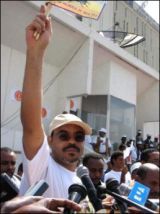Ethiopian ruling party holds onto lead in preliminary election tally
ADDIS ABABA, May 26 (AFP) — Ethiopia’s ruling party continues to hold its lead in May 15 parliamentary polls with preliminary results in from 65 percent of the country’s 547 constituencies, the national electoral board said Thursday.

|
|
Ethiopian Prime Minister Meles Zenawi addresses supporters in Addis Ababa. (AFP). |
A day after EU election observers criticized post-vote irregularities as undermining confidence in the polls, the board said the ruling Ethiopian People’s Revolutionary Democratic Front (EPRDF) had won 207 of the 357 constituencies from which it had received results.
A regional party allied with the EPRDF took six seats, while the country’s two main opposition groups, which held only 12 seats in parliament before the election, took 133, and two smaller opposition groups won seven seats.
Four independent parties won a seat each, it said.
Final official nationwide returns are not due to be released by the board until June 8 although it had expected to release a preliminary overall tally from Ethiopia’s more than 30,000 polling stations on May 21.
Both the EPRDF, which has conceded some losses, and the opposition have declared themselves the victors in the hotly contested elections in which more than 90 percent of the country’s 26 million registered voters cast ballots.
The opposition has complained of widespread fraud and threatened to boycott the next session of parliament unless its accusations are properly addressed.
The delay by the National Electoral Board of Ethiopia (NEBE) in releasing results, premature victory claims by both the ruling party and opposition as well as post-election pro-government bias in the state media coverage were all criticized by the EU observers on Wednesday.
“These practices, taken as a whole, are seriously undermining the transparency and fairness of the elections,” the EU observers said.
“They also risk increasing the scope for manipulation and consequently putting in doubt public confidence in the process,” they said.
The government and the national election board immediately disputed the observations, with a NEBE spokesman calling them “unfair” and a senior government official saying they were “wild accusations.”
